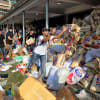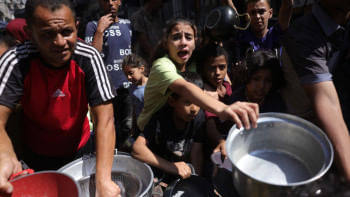Government urgently needs to arrange relief for all flood-hit people

We have not seen such devastating floods in the country since 1988. Every year during monsoon, the haor areas of Sylhet and Sunamganj districts experience flooding – but it has never been this catastrophic. Within a very short period of time, the entirety of the two districts were flooded. It is impossible to describe how badly the people have been suffering, as they have been living under the open sky for days now. They are waiting desperately for food and shelter. But surprisingly, the government does not seem to have an efficient relief management plan for the victims. We have seen in the media that there is a shortage of relief, especially baby food, in the affected areas, which should not have been the case. We have seen how the local government officials are seeking assistance from people. In the current circumstances, the government must immediately provide the flood-hit people with dry foods such as biscuits, breads, puffed rice, and safe water so that people can at least survive. The government must gear up its relief operations.
I think the first thing that the government should have done as the flood situation was getting out of control was declare a local emergency and engage the army and others to immediately start helping people with relief and additional emergency services. I remember, in 1988, people in Dhaka got united to help the flood victims across the country – they made roti for them and went to the regions to help the victims. This time the situation may not be as bad, but still the government's measures seem to be very inadequate compared to the needs of the people.
The lack of coordination among different government agencies has always been a major barrier in implementing any plan effectively. That has also been the case during this flood. As we know, and has been reported in the newspapers, there were forewarnings that the flood situation would get worse. Bangladesh Water Development Board (BWDB) knew about it around 15 days ago and informed the Department of Agricultural Extension (DAE) about it so that they could take measures to save the crops, etc. But we do not know if the Ministry of Disaster Management and Relief (MoDMR) had this information. Had all the government agencies concerned worked together, the damages done by the floods could have been reduced.
We have also heard that many of the development projects taken in that region are actually making the flood situation worse. People are particularly mentioning the all-weather road going through the haor area which has become a major barrier for the water from upstream to flow downstream. The government must look into these allegations and correct the faults that have been created in the name of development. We also know how the rivers and water bodies in the Sylhet and Sunamganj areas have been grabbed and filled up over the years. The Surma River has literally been choked up by plastic pollution. Don't our authorities know these facts? If they do, what have they done to save these water bodies? And, will we take any lesson from this devastating flood that has been wreaking havoc in Sylhet and Sunamganj?
Already many other districts have been affected by flood. And we do not know when the situation in Sylhet and Sunamganj will improve. For now, the government's only priority should be to save lives by providing the affected people with food, water, medicine, and shelter.
Dr M Asaduzzaman is former research director, Bangladesh Institute of Development Studies (BIDS).

 For all latest news, follow The Daily Star's Google News channel.
For all latest news, follow The Daily Star's Google News channel. 








Comments